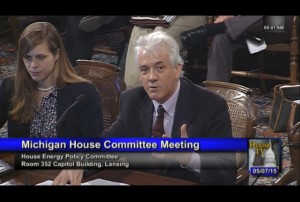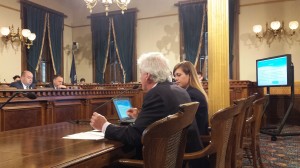MEC’s House Energy testimony: 5 takeaways

Spring temperatures aren’t all that’s heating up in Lansing. With Michigan’s 2008 clean energy laws set to plateau at the end of the year, policymakers are debating a handful of competing proposals for what our state’s energy future should look like. (We say “plateau” and not “expire” because, if lawmakers took no action, utilities would have an ongoing requirement to meet the existing standards.)
Gov. Snyder’s plan calls for as much as 19 percent renewable energy by 2025, along with a significant increase in energy efficiency and a shift away from coal and toward more natural gas. The Democrats have proposed generating 20 percent of Michigan’s electricity from renewable sources by 2022 and doubling the state’s annual energy savings from 1 to 2 percent.
Today the House Energy Policy Committee held a hearing on another package introduced by Rep. Aric Nesbitt, the committee’s Republican chair. The bills propose a number of actions that would turn back the clock on the economic development, cost savings and carbon reductions Michigan has achieved since 2008. For instance, they would repeal the energy efficiency standard and reclassify hazardous waste materials like scrap tires and railroad ties as “renewable” fuels.
MEC Policy Director James Clift and Energy Program Director Sarah Mullkoff testified at length during today’s hearing, making the case that Michigan needs a comprehensive energy plan that controls costs, maintains electric reliability, minimizes risks to ratepayers like you and me, promotes economic development in Michigan and protects natural resources. (You can view their presentation here.)
Here are five highlights from their testimony:
Households bear the brunt of energy costs. Electricity rates in Michigan have been increasing for years across sectors, but recently those costs have been shifted from large industrial users onto the backs of residential ratepayers. In fact, our residential rates are the highest in the region and among the highest in the country. If the Michigan Public Service Commission grants utilities permission to collect the rate increases they’re now seeking, our residential rates would increase an additional 15 percent over the next three years. On top of that, Michigan taxpayers are subsidizing a fleet of old, inefficient coal plants whose performance is well below the industry average.
Efficiency should be a top priority. It’s a well-worn phrase, but it’s true: The cheapest energy is the energy we don’t use. Research shows Michigan can reduce our energy demand by at least 15 percent over the next decade through energy efficiency measures. Eliminating energy waste will only cost about a third as much as generating the same amount of electricity, and it will save Michigan families nearly $4 for every dollar invested. 
Better rate design could be transformative. Consumer behavior can go a long way in helping reduce energy costs. You know how your phone occasionally notifies you that you’re in roaming mode, which costs more? Most of us avoid making or continuing calls when we get those alerts, opting to call later, when rates are lower. The same kind of price signaling is possible in our energy system, too. A push notification sent to your cell phone could alert you that electricity prices will temporarily increase as demand spikes. If you were home, you would likely wait to run your dishwasher or do laundry. You might run your air conditioner in the morning and turn it off when prices go up. With the right technology, you could take those same actions remotely through your cell phone. Pilot programs show adopting time-of-day pricing in Michigan could shave peak demand by 630 megawatts for Consumers Energy and 521 megawatts for DTE—roughly the equivalent of both utilities shutting down a coal plant. Doing so would save Michigan ratepayers some $200 million per year.
It’s a buyer’s market for solar. The Lansing Board of Water and Light recently requested proposals from developers to add five megawatts of solar to the municipal utility’s portfolio. The proposals they received quoted solar power at such low prices—about $65 per megawatt hour in the winning bid—that the utility instead decided to install 20 megawatts. The real beauty is that the contract has a fixed price over the next two decades, an advantage no fuel-based technology can offer ratepayers. (That’s part of the reason we recently added solar panels to MEC’s rooftop.) The planned array will be nearly 20 times larger than any other solar installation in Michigan and will nearly double the state’s solar capacity. Experts argue solar power is an especially good value because it is most abundant on those long, hot summer days when our electric grid is under the most stress. If our investor-owned utilities want what’s best for ratepayers, they should be buying all the solar capacity they can at these record-low prices.
The proposed legislation falls short. The chairman’s bills do nothing to help control or reduce Michigan’s high energy costs, instead leaving decisions that affect us all up to the utilities. In gutting the energy-efficiency standard, they would take away our most affordable way to meet demand. And they would allow the utilities that enjoy a near-monopoly on our energy system to avoid expanding their renewable portfolios—which would provide customers with long-term price stability—and instead dump millions of dollars into keeping old coal plants limping along.
As these debates continue—Republican Senate energy chair Mike Nofs is set to introduce his energy package any day—MEC will continue working to protect ratepayers and the health of Michigan residents by calling for a well-balanced energy portfolio that’s better for the environment and helps to grow our economy.
###
Top image via House TV.
Comments are closed.



Thank you for all you do MEC, there’s way too little conversation about such an important topic. Please keep pushing forward … for all of us.
All Good - DM.
Thanks for your interest, Dave!